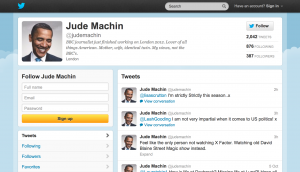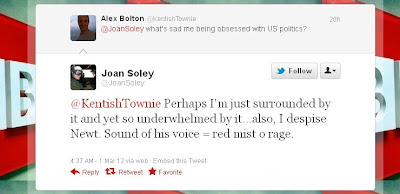Following on my post explaining the situation, here are the tweets. Some will be screenshots or some other form of publishing because the actual tweets have been deleted after the BBC staff member responsible was caught. With one exception, there are no retweets here, as that’s a separate debate. A comprehensive research project if far beyond my means, but just scanning through so many of them tells me that for many BBC employees, this is just the tip of the iceberg. Note the trends on certain issues.
Because some people seem to keep missing the point, let me repeat: This is not meant to prove that all tweets are biased, nor is it meant to prove that all BBC staff are 100% of the Left. Many BBC employees are fairly responsible with Twitter, and do not tweet their political opinions at all. This is meant to prove that those who do freely tweet their personal political and ideological opinions are nearly all of the Left. Nearly every department of the BBC is represented here, both on air talent and editors and producers behind the scenes. This also demonstrates that in many cases the line between official and personal accounts has been blurred so much as to be essentially non-existent, contrary to BBC guidelines. The whole thing needs to be trashed and re-examined.
This is mostly all thanks to the keen eye of DB, without whose vigilance this would not have been possible. I just kept a list as the sheer volume of them began to reveal certain patterns, before starting to search the feeds myself. Other contributors are: Craig, Reed, Jeff W, Guest Who, Laban, Notasheep, BBC Waste, David Vance, ChrisH, and yours truly. (Apologies if I missed anyone.)
Kaye Adams, BBC Scotland radio presenter
KAYE Adams, the BBC broadcaster, has been accused of being unfit to present a top current affairs programmes after she tweeted that Boris Johnson “should p*** off back to boarding school”.
The former presenter of Loose Women, the ITV talk show, who presents a popular Radio Scotland show, was on holiday in Tuscany when she made a series of expletive-filled Tweets about London’s mayor. She has now apologised and deleted the comments from her Twitter site.
Paul Adams, BBC Washington correspondent
Wow – Obama could look like Nelson Mandela by the time this is over. @bbcnewsus #election2012. businessinsider.com/bloomberg-busi… via @bi_politics
Tweet obviously deleted.
— Paul Adams (@BBCPaulAdams) November 7, 2012
Also, when reporting from the Republican National Convention, Adams made 10 tweets, all negative, and for only one day, Aug. 30. From the Democrat’s convention, he made 30 tweets over three days, Sept. 4-6, all positive, including the #DNC2012 hashtag. The RNC hashtag was absent from all of his tweets.
Sarah Afshar, Senior producer for Newsnight
Giles Fraser is great #newsnight
— Sara Afshar (@SaraAfshar) January 4, 2012
@jossgarman I actually cheered at one point — Sara Afshar (@SaraAfshar) January 4, 2012
Anita Anand, BBC Radio and TV presenter
Very impressed with Janet Ellis on the wright stuff talking about David starkey. — anita anand (@tweeter_anita) August 16, 2011
In case anyone isn’t sure who Anand is, a charming photo of her can be seen here. The other person in that photo is the star of his own R5 Live show, Richard Bacon.
Can’t find the link but the Sarah Palin extract in Sunday Times Review is fascinating again. So self serving & transparent. — richard bacon (@richardpbacon) November 29, 2009
Did you just see Obama’s speech. My God, had there been a better political orator in own time? Last 6 or so mins were remarkable I thought. — richard bacon (@richardpbacon) September 10, 2009
Here’s a screenshot of Bacon telling his followers to check out a vicious anti-Palin article by her personal womb inspector, Andrew Sullivan.
Wendy Bailey, former BBC Radio broadcaster, producer Children in Need, and lots more.
@mehdirhasan it’s a game – Tories say this line ever chance they get – I hope it backfires. People aren’t stupid. #BBCQT — wendy bailey (@wendybaileypr) November 8, 2012
@bbcfreespeech you bet I’m interested in who is US President! I just hope to God it’s Obama – as the alternative is untenable. — wendy bailey (@wendybaileypr) November 6, 2012
Ros Ball, BBC Parliament correspondent (with an activist statement photo on her Twitter page)
@politicalyeti *Wonder* if the Tories are sending out information to staff about sexual harassment procedures at the moment, like the BBC — Ros Ball (@Rosball) October 17, 2012
Today, BBC Sports Personality of the Year has been brought to you by the letter P, for patriarchy t.co/wQFl3xU3 — Ros Ball (@Rosball) November 29, 2011
Lucy Worsley crush is so justified. She was an 11yr old Marxist & said David Starkey looks like a cross owl: bit.ly/ohIWHK — Ros Ball (@Rosball) September 8, 2011
Bob Ballard, BBC Radio commentator on swimming and diving
ladies and gentlemen..possibly the next President of the USA..man the lifeboats now. youtube.com/watch?v=TjMnFn…
— Bob Ballard (@bobballardsport) August 15, 2011
And..lest we forget..the leader of the free world is a Hammer – well done Barack – see you at Ken’s Caff soon telegraph.co.uk/sport/football… — Bob Ballard (@bobballardsport) November 7, 2012
Mark Barlex, BBC On Demand editor, tweeted from the BBC College of Journalism account(!)
Mark Barlex:”The gift that keeps on giving” http://bit.ly/b4DrnR — BBC Journalism (@BBCCollege) February 15, 2010
The “gift” is the video hosted on the BBC website of that Iraqi reporter throwing a shoe at George Bush.
Mark Barlex: “Beautifully constructed;beautifully realised. The Obama Inaug piece is still important.” http://bit.ly/coUlXO 150,000 hits — BBC Journalism (@BBCCollege) February 15, 2010
He’s talking about the Newsnight report on the inauguration speech which the BBC edited to make the President sound more Green-friendly.
Mark Blank-Settle, BBC College of Journalism social media maven
Wow. Sarah Palin put a bullseye on the Arizona congresswoman who’s been shot in the head: #Giffords http://nprs.tk/f1qMWH — marc blank-settle (@MarcSettle) January 8, 2011
Claire Bolderson, BBC presenter
I love the guy but #polishdeathcamps is a bad Obama gaffe especially as scripted not off the cuff on.wsj.com/LdwygC — Claire Bolderson (@ClaireBolderson) May 30, 2012
Peter Bowes, BBC correspondent in the US
RT @leodicaprio: Climate victory in Cancun but still a long road ahead. Good summary here: http://bit.ly/eD1bDB#COP16 #ecomonday — Peter Bowes (@peterbowes) December 14, 2010
Jane Bradley, BBC Midlands Current Affairs producer
Cannot believe Chomsky, Pilger, Assange are speaking in Trafalgar Sq and I’m too sodding hungover to go. From my sofa, I urge you all to GO. — Jane Bradley (@jane__bradley) October 8, 2011
Thoughtful piece on politics & music – worth a read: MT @tom_watson A defence of folk singer @fthc by @billybragg guardian.co.uk/commentisfree/… — Jane Bradley (@jane__bradley) September 9, 2012
Ha RT @afneil: Washington Post to Romney: rule number one when visiting a foreign country. Don’t insult it. #Romneyshambles
— Jane Bradley (@jane__bradley) July 27, 2012
Watching it as an adult, pretty sure Pocahontas isn’t actually a love story but a warning against capitalism & imperialism. Disney style.
— Jane Bradley (@jane__bradley) July 22, 2012

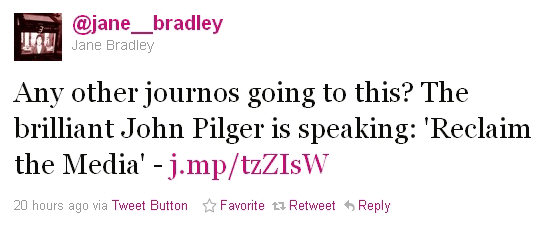
Toby Brown, BBC News Channel producer
Am reading an essay on American capitalism and it’s effect on women. 50% jealous of academia. 50% glad to be out of it…
— Toby Brown (@browntoby) April 19, 2012
Mario Cacciottolo, BBC journalist
Dear America. Your president is cool, witty and classy. Everyone likes you more when he’s in charge. Love, The Rest of The World — Mario Cacciottolo (@SOTMario) November 7, 2012
Jenny Clarke, BBC Radio Manchester
Shut up going on about how great Manchester is George Osborne. We know it is and flattery will not buy our votes. Now kindly fuck off.
She soon got caught out, tweet and entire account deleted before we could get the embed code. Original tweet url was: http://twitter.com/#!/jenrclarke/status/120849989885902848. She then set up a new account @jennyfleur88. Tweets protected now.
Katie Connolly, ex-BBC US correspondent. From Newsweek to the BBC, now works at a Democrat strategy group, worked on the campaign to re-elect the President. Go figure. Lots of tweets, too much to post here, but Craig’s list and full analysis can be read here. Highlights:
this palin speech is more like a stand up routine, esp with the redneck jokes 1,273,863,138,000.00 via TweetDeck ouch. sarah palin calls us the lamestream media. #palin #nra RT @chucktodd: FOIA-requested Todd Palin related emails involving Palin’s time in office in Alaska now up on MSNBC.com. http://ping.fm/YGnCF 1,265,387,931,000.00 via TweetDeck My boss Jon Meacham responds to critics of our Sarah Palin cover photo http://bit.ly/G5iCz 1,258,492,120,000.00 via TweetDeck
She regularly corresponded with a number of JournoListas, and RTed their groupthink as often as possible.
Matt Danzico, BBC News reporter in the US, and former Obama campaigner. His Twitter page has both the disclaimer and the BBC logo wallpaper
Brooklyn! @bobulate and @brainpicker want your books TODAY to rebuild the #OWS collection. Details j.mp/vAYvF6 #OWSBookmobile — Matt Danzico (@mattdanzico) November 19, 2011
Doing some cold calling in Bushwick to get that vote out mister. — Matt Danzico (@mattdanzico) November 4, 2008
(UPDATE: Forgot to mention this last one is from before Danzico worked for the BBC. This was from back when he was working for the 2008 campaign. Usually people go work for a political party or campaign after a stint at the BBC. I included this to demonstrate both his consistency and as an example of what is not an obstacle to being hired as an impartial journalist.) Several more can be seen here. Tom Donkin, journalist for BBC News Online Magazine
Whatever his faults or criticisms – #Obama is the coolest president there is youtube.com/watch?v=Zip9l2… — Tom (@TomDonkin1) April 25, 2012
Who’da thought @snoopdogg could be one of #Obama‘s most articulate supporters. Great endorsement youtube.com/watch?v=sOfHer… — Tom (@TomDonkin1) September 12, 2012
Gavin Esler, newsreader, presenter for Newsnight and Dateline
1990s verbal attacks on US govt linked by Bill Clinton to the violence of Oklahoma bombing. 2011? Congresswoman on political hit list shot. — Gavin Esler (@gavinesler) January 9, 2011
Stephanie Flanders, BBC Economics editor
Ryan is risky VP choice for Romney. Republicans now so extreme, his main appeal 4 swing voters was record as a moderate. Ryan anything but. — Stephanie Flanders (@BBCStephanie) August 11, 2012
Matt Frei, ex-BBC, now with C4, former anchor of BBC World News America
Could the GOP now define itself in its reaction to healthcare reform in a way it might regret later this year. Remember Tories = Nasty Party — Matt Frei (@mattfrei) March 22, 2010
Leah Gooding, newsreader for BBC Newsround (Screenshot because Jude Machin changed the avatar after complaints, relevant tweet deleted.) 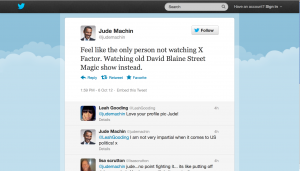 Jim Hawkins, BBC Radio Shropshire (One of many presenters who uses his “unofficial, personal” account as the official one for a BBC show)
Jim Hawkins, BBC Radio Shropshire (One of many presenters who uses his “unofficial, personal” account as the official one for a BBC show)
US Congresswoman Giffords shot dead http://bbc.in/dX7XYg had been ‘targeted’ by Sarah Palin’s website http://huff.to/bFCpVi — Jim Hawkins (@jimallthetime) January 8, 2011
@biasedbbcblog @davidacgregory LOL! Cheers, David, hadn’t realised they were still plugging on. Bless ’em — Jim Hawkins (@jimallthetime) November 22, 2011
So we’re spending very slightly more on foreign aid than we are on the police. And … ? Some people seem annoyed by this — Jim Hawkins (@jimallthetime) October 17, 2012
Rhys Hughes, BBC Radio 1 producer
@chicagowhite let’s hope so. MOT — Rhys Hughes (@RhysHughes) November 4, 2012
Here’s what his avatar was until DB posted it last week and somebody told Hughes to clean up his act. 
@realdonaldtrump democracy hurts eh Donny? — Rhys Hughes (@RhysHughes) November 7, 2012
Katty Kay, anchor, BBC World News America and pundit in official BBC capacity on MSNBC and other show
Campaigning suspended in France’s presidential election after shooting in Toulouse. But did political tone contribute to horrific killings? — Katty Kay (@KattyKayBBC) March 20, 2012
Growing Inequity between rich and poor is not just a social injustice, it creates economic problems. nyti.ms/pBPXQy — Katty Kay (@KattyKayBBC) August 31, 2011
Palin, Limbaugh, Thatcher, the Guardian and summer madness. Hilarious. gu.com/p/2pkng/tw via @guardian — Katty Kay (@KattyKayBBC) June 10, 2011
Rachel Kennedy, BBC News editor  Screenshot because Kennedy deleted the tweets after Guido Fawkes linked to DB’s post on them and it gained wider attention. Same goes for this one:
Screenshot because Kennedy deleted the tweets after Guido Fawkes linked to DB’s post on them and it gained wider attention. Same goes for this one:  Dominic Laurie, Business presenter for Radio 5 Live
Dominic Laurie, Business presenter for Radio 5 Live
Now the NHS. so we’ve had the china up yours. Now it’s the US Romney up yours! #socialism — Dominic Laurie (@dominic_laurie) July 27, 2012
RT@ismh Just gave my kids a kiss as they sleep. Thanks to healthcare reform I can afford to insure them both not just the one without cancer — Dominic Laurie (@dominic_laurie) November 7, 2012
Big event this week is attempt by Palestinians to get enhanced observer status at UN Gen Ass on Thursday. Another log on the fire. — Dominic Laurie (@dominic_laurie) November 26, 2012
Brian Limond, “controversial” BBC Scotland comedian
“Would Prince William write to FIFA on behalf of the Scotland team wearing poppies? No. Cos he thinks ENGLAND won the war.” This message was quickly followed by; “I’d love to slide a samurai sword up Prince William’s arse to the hilt, then yank it towards me like a door that won’t f@*king open.” This was eventually followed by another anti-Royal family message: “Absolutely f@*k England and its royal wee family living it up while pensioners freeze to death.”
Tweets deleted after complaints. More here. Sue Llewellyn, BBC social media expert  This is the only Retweet in this collection, included here as evidence of the groupthink regarding Sarah Palin, and particularly the blood libel so many BBC journalists and other staff tried to push. Even one of the BBC’s experts in social media felt free to retweet such a thing. Now for an original tweet:
This is the only Retweet in this collection, included here as evidence of the groupthink regarding Sarah Palin, and particularly the blood libel so many BBC journalists and other staff tried to push. Even one of the BBC’s experts in social media felt free to retweet such a thing. Now for an original tweet:
So Cameron doesn’t know what Magna Carta means. What would Andrew Mitchell (allegedly) say about that? — Sue Llewellyn (@suellewellyn) September 27, 2012
Jude Machin, BBC journalist, formerly US-based, now in UK (See Leah Gooding above) Screenshots because it’s all been sent down the memory hold after she got caught, then got caught again, then got caught again. 

@leahgooding I am not very impartial when it comes to US politics! x — Jude Machin (@judemachin) October 6, 2012
James Macintyre, former BBC Question Time producer, now political editor for Prospect magazine and Ed Miliband’s biographer
That the BBC is leftwing is one of the biggest myths in British public life. Only helps Murdoch in the end.
— James Macintyre (@James_Macintyre) March 20, 2012
Chris Mason, BBC political correspondent
Screenshot because his Twitter feed archive wouldn’t go back far enough
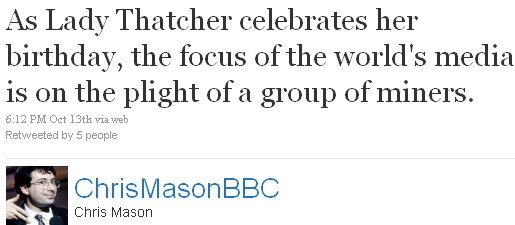
Paul Mason Newsnight economics editor
@chedzzz if I ever own a dog I will call him Gramsci
— Paul Mason (@paulmasonnews) March 31, 2010
@warrenellis @greg_palast @pennyred sorry I missed it – on air, dammit!
— Paul Mason (@paulmasonnews) June 26, 2012
Hear that America? NATIONAL HEALTH SERVICE
— Paul Mason (@paulmasonnews) July 27, 2012
John Mervin, BBC News New York business editor
Win the future. WTF? President Obama appears to have sidestepped Social Security as well.
— john mervin (@jnmervin) April 13, 2011
Shame Time doesn’t have the same influence any more, because this needs to be said. Again and again. ti.me/jk3EOU
— john mervin (@jnmervin) June 17, 2011
Link goes to Time magazine article about how “Conservatives have lost touch with reality”
“Ann drives a couple of Cadillacs, actually.”Mind boggling. — john mervin (@jnmervin) February 25, 2012
Claudia Milne, editor BBC News Online US edition
@jamesfallows just on BBC World News America – he is my hero — Claudia Milne (@claudmilne) May 2, 2012
Fallows was Jimmy Carter’s speechwriter and is a popular Left-wing pundit
Daniel Nasaw, US-based feature writer for BBC News Online Magazine
Romney pledges to repeal the “death” (estate) tax, which only the wealthiest pay // Who can blame him for looking out for his children??
— Daniel Nasaw (@danielnasaw) March 7, 2012
Romney’s record: Got rich, lured corporate sponsors for the ’02 Olympics, signed an individual mandate, ran for president. Anything else?
— Daniel Nasaw (@danielnasaw) May 25, 2012
Always hoped he’d run for NYC mayor, to see him take on a sanitation strike MT @mattyglesias: Clinton as WH Press Sec’y would be amazing
— Daniel Nasaw (@danielnasaw) September 7, 2012
Matt Prodger, BBC Home Affairs correspondent
Locog should have Romneyshambles on the payroll. He’s united the nation behind the olympics at last. All hail Mr Leader.
— matt prodger (@MattProdger) July 26, 2012
Usual suspects lined up against the tobin tax: Hannah, Hoban, Carswell and “spare us a penny” city traders. Suggests it could be popular.
— matt prodger (@MattProdger) September 28, 2011
Save the Children says British mothers can’t afford to work because of childcare costs. M/while, we can afford a tax break for the rich.
— matt prodger (@MattProdger) September 7, 2011
Mark Sandell, editor World Have Your Say, BBC World TV and World Radio
Watching Chuck D at Cleveland conference ‘I grew up in an age of R and B – unfortunately that meant Reagan and Bush’ #nice #whys
— Mark Sandell (@MRSandell) October 10, 2011
Why have few musicians got involved in Wall Street demos – has something happened to the great history of American protest? #freespeechCLE
— Mark Sandell (@MRSandell) October 10, 2011
Very proud that @billybraggis on #whys talking to Occupy Cleveland demonstrators about protest music
— Mark Sandell (@MRSandell) October 11, 2011
Joan Soley, BBC News Pentagon correspondent (note BBC News wallpaper despite “my views” disclaimer)
@kentishtownie Perhaps I’m just surrounded by it and yet so underwhelmed by it…also, I despise Newt. Sound of his voice = red mist o rage.
— Joan Soley (@JoanSoley) March 1, 2012
@nhickey The only reason I sleep so well at night is my firm belief that he would have to first find Britain on a map…
— Joan Soley (@JoanSoley) February 29, 2012
Regarding one of the Republican presidential candidate debates:
@nhickey So it seems at times…sigh. I certainly feel less intelligent having watched this freak show for over a hour already… — Joan Soley (@JoanSoley) June 14, 2011
Brett Spencer, Radio 5 Live Interactive editor Screenshot because he deleted the tweets after being caught.  Allegra Stratton, Newsnight political editor
Allegra Stratton, Newsnight political editor
Can’t believe the PM has got positive front-pages out of his back of match-box energy pre-announcement… Reckon he won’t believe it either — Allegra Stratton (@BBCAllegra) October 17, 2012
Jeremy Vine, Radio 2 host, Eggheads presenter, former Newsnight journalist (and another one who uses his “personal” account as the official one for his BBC show)
WATCH. Eleven seconds in, did Mitt Romney use a magician’s sleight of hand to produce notes, which are banned? democraticunderground.com/1251119479 — Jeremy Vine (@theJeremyVine) October 6, 2012
Sarah Walton, journalist for BBC Look North
“@jane__bradley: Cannot believe Chomsky, Pilger, Assange are speaking in Trafalgar Sq > WOW! Is anyone filming/streaming this online? — Sarah Walton (@SarahWaltonNews) October 8, 2011
Tim Weber, ex-BBC business & technology editor for BBC Interactive, now Director at Edelman
All you need to know about News Gingrich, in one simple cartoon (Doonesbury) bit.ly/wteWpr — Tim Weber (@tim_weber) January 9, 2012
Slightly amused that Romney blames Obama for home foreclosures (Bush), govt debt (Bush) and gas/petrol prices (world markets). — Tim Weber (@tim_weber) April 4, 2012
US government to make profit from bailouts, Treasury says bbc.in/HK0sf2 Not that Romney or any other Republican will note — Tim Weber (@tim_weber) April 16, 2012
Lucy Williamson, BBC Seoul correspondent
Next week: Tesco takes over the NHShttp://bit.ly/9iruYf — Lucy Williamson (@LucyWilliamson) April 26, 2010
Screenshots because Twitter feed archive doesn’t go back far enough:


Plenty more here.
And there you have it. Come see the bias inherent in the system. I’ve actually lost count of how many tweets there are and how many Beeboids are represented. Someone else will have to do it now since my eyes are all bleary from laying this out.
For balance, here’s one which appears to be from the Right by James Landale, BBC News political correspondent (h/t Jim Dandy)
Net migration down “significantly”, says ONS, from 242k to 183k. Good day to bury good news??
— James Landale (@BBCJLandale) November 29, 2012
Oh, and apparently Andrew Neil is on the Right, and Nick Robinson used to be in his youth. Balanced or what?


